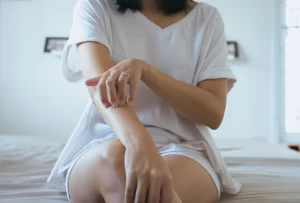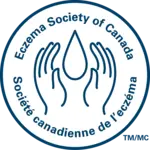From distraction to cooling down, Dr. Eshtiaghi offers her best tips to beat the itch of eczema
 There is a saying in dermatology, “If the rash doesn’t itch, it’s not eczema,” and we know this all too well! Itch is often noted as one of the most bothersome symptoms of atopic dermatitis (AD), the most common form of eczema.
There is a saying in dermatology, “If the rash doesn’t itch, it’s not eczema,” and we know this all too well! Itch is often noted as one of the most bothersome symptoms of atopic dermatitis (AD), the most common form of eczema.
Eczema Society of Canada reached out to Dr. Panteha Eshtiaghi, Toronto-based dermatologist and ESC board member, for her best tips to beat the itch of AD.
Tips to manage the itch:
- Keep nails smooth and trimmed short to reduce damage from scratching and secondary infections.
- Try a cool compress or take a cool bath or shower (ideally 5-10 minutes). Follow immediately with moisturizer to lock in hydration.
- Try to reduce stress as much as possible. Find activities you enjoy and that help you relax, such as walking, journaling, meditation, cooking, or exercise. Consider mindfulness apps for added support.
- The use of moisturizer may help to relieve dry skin and the itch. Use a fragrance-free cream or ointment at least twice a day – and always after bathing.
- Distraction can help! This works for children and adults alike. A preferred video, a board game, a stress ball, or some other favourite activity can help to distract us when the itch hits.
- Don’t say “Don’t scratch!”. We know this can be so tempting for parents and loved ones to say, but it doesn’t help the patient who is suffering, and it can lead to feelings of guilt and shame. Instead, offer empathy and practical alternatives, such as engaging in an activity.
- Cover affected areas to prevent scratching with soft, breathable fabrics.
- Prepare for overnight camps by packing fragrance-free moisturizers, cool compress packs, and any prescription topical treatments and discuss your child’s eczema needs with camp staff to help minimize triggers.
Remember, atopic dermatitis is a chronic condition, and managing itch is a daily effort. With consistent care and the right strategies, you can reduce the impact of itch on your or your child’s quality of life.
ESC thanks Dr. Panteha Eshtiaghi, Toronto-based dermatologist, for her volunteer contributions to this resource.
Disclaimer: Information provided in this resource does not constitute medical advice and is not intended to be used as a diagnostic tool. The information is up-to-date at time of publication. All medications, interventions, and treatment plans have risks and benefits, and it is important that individuals discuss their or their child’s specific health care needs with a qualified health care professional.
July 2025
